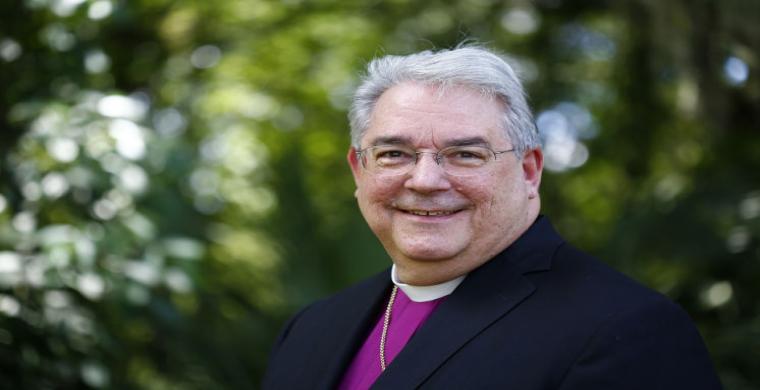ST. PETERSBURG, FL: Episcopal bishop ponders whether to sanction same-sex blessings
By Waveney Ann Moore, Times Staff Writer
http://www.tampabay.com/news/religion/
June 29, 2014
The bishop of the Episcopal Diocese of Southwest Florida may soon announce that he will allow priests to bless same-sex relationships. The Episcopal Church approved the provisional rite back in 2012, but it’s up to bishops to decide whether to offer it.
Early this year, Episcopal Bishop Dabney Smith stood before a crowd of about 175 people who wanted him to authorize same-sex union blessings.
The meeting, in the parish hall of St. Peter's Episcopal Cathedral in downtown St. Petersburg, was of particular significance.
It took place at the "mother church" of Smith's diocese, which stretches from Brooksville to Marco Island and includes Tampa, St. Petersburg and Plant City. St. Peter's also is home to an energized group of lesbian, gay, bisexual and transgender members with strong support from congregational leaders and parishioners.
Smith fielded questions that January evening, but was not ready to offer a decision on a topic that has roiled his and other denominations. His answer could come soon.
The cathedral's hopes, meanwhile, are on display in a recent newsletter announcing that St. Peter's will "move toward offering" the blessings.
"There are still a number of details to be worked out, but we are prepared to take this step," the Very Rev. Stephen B. Morris, dean of St. Peter's, states in the newsletter article.
A task force Smith appointed met for its final time last week, and Smith said he will discuss its recommendations with church leaders before rendering a decision that could unsettle his flock of 31,000 baptized members in the Diocese of Southwest Florida.
"Clearly my pastoral sensitivity to people is I want people to be able to feel protected, love who they love, be accepted," Smith said in a recent interview with the Tampa Bay Times. "Furthermore, there's the reality that people of all sorts of different perspectives struggle with issues of cultural dynamics, biblical authority and the interpretation of Scripture."
The anxiety about what Smith will do comes two years after the Episcopal Church passed a resolution approving a provisional liturgy for same-sex relationships. Bishops in individual dioceses have the prerogative to authorize the rite.
Stephen Graumlich, who married his partner, Russel Kirk, 10 years ago in Vancouver and sat on the bishop's task force, is optimistic that the blessings will be approved.
"I think most of the fallout has already been experienced," he said.
In 2003, the election of the Episcopal Church's first openly gay bishop caused entire congregations to abandon the 2.1 million member denomination.
During interviews, Smith and St. Peter's dean spoke of their call to minister to those on both sides of the issue. It's complex, the bishop said, encompassing both legal protections for people and Christianity's "theologically shared understanding of the sacrament of marriage."
"A bishop's role is to be the guardian of the faith and I don't take that lightly," Smith said.
Morris recalled when African-American children were bused to his Louisiana school. "I grew up knowing there was oppression. And I grew up knowing that whatever the circumstances, I did not want to be the oppressor," he said.
"I like very much being a part of something that liberates other human beings to live a much more joyful and complete and whole life."
Of the five Episcopal dioceses in Florida, two permit same-sex blessings.
Bishop Philip Duncan II, a former priest at St. John's in Clearwater, said his Diocese of the Central Gulf Coast started allowing the blessing shortly after it was approved in 2012. The diocese covers the northwest Florida Panhandle and southern Alabama.
"We were very clear that this is not about same-sex marriage," Duncan said.
In the neighboring Diocese of Central Florida, with headquarters in Orlando, clergy can "officiate, bless or participate in, only those unions prescribed by Holy Scripture: the wedding of one woman and one man."
The prohibition was not in response to the 2012 resolution, spokesman Joe Thoma said, but in place years earlier.
Bishop Samuel Johnson Howard of the Diocese of Florida, with headquarters in Jacksonville, said he has not authorized the blessing.
But in the Diocese of Southeast Florida, which includes West Palm Beach and stretches to Key West, same-sex unions have been blessed even before 2012, spokeswoman Altoria White said.
Bishop Leo Frade believes "love should be honored regardless of who is loving whom," White said.
Other denominations also appear to be moving toward change. A few days ago, the Presbyterian Church (USA) voted to allow its clergy to perform same-sex marriages in states where it is legal. And last week, the United Methodist Church reinstated a minister it had defrocked for officiating at his son's same-sex marriage.
For some Christians, same-sex unions have been less of an issue. The Rev. Leddy Hammock, senior minister at Unity Church of Clearwater, has been performing gay marriages for decades.
"I have never declined a request for a same sex-blessing and I have always felt willing to claim that as a marriage ceremony," she said.
At the Metropolitan Community Church of Tampa, a member of a denomination with roots in the LGBT community, interim pastor the Rev. Pressley Sutherland said MCC congregations have had holy unions for more than 40 years.
First United Church of Tampa is making its own statement.
"We passed a policy in 2008 that says that until we can perform marriages for everyone, we won't perform marriages," the Rev. Bernice Powell Jackson said.
In Judaism, both the Conservative and Reform movements have created rites for blessing same-sex marriages.
Graumlich, 68, who sits on St. Peter's governing board, sought to explain the importance of the quest for a same-sex blessing. "It's a public acknowledgement of a private commitment you made to a partner. It implicitly conveys parity," he said.
"It says as a church we have one membership level and that's a really powerful statement."
END














